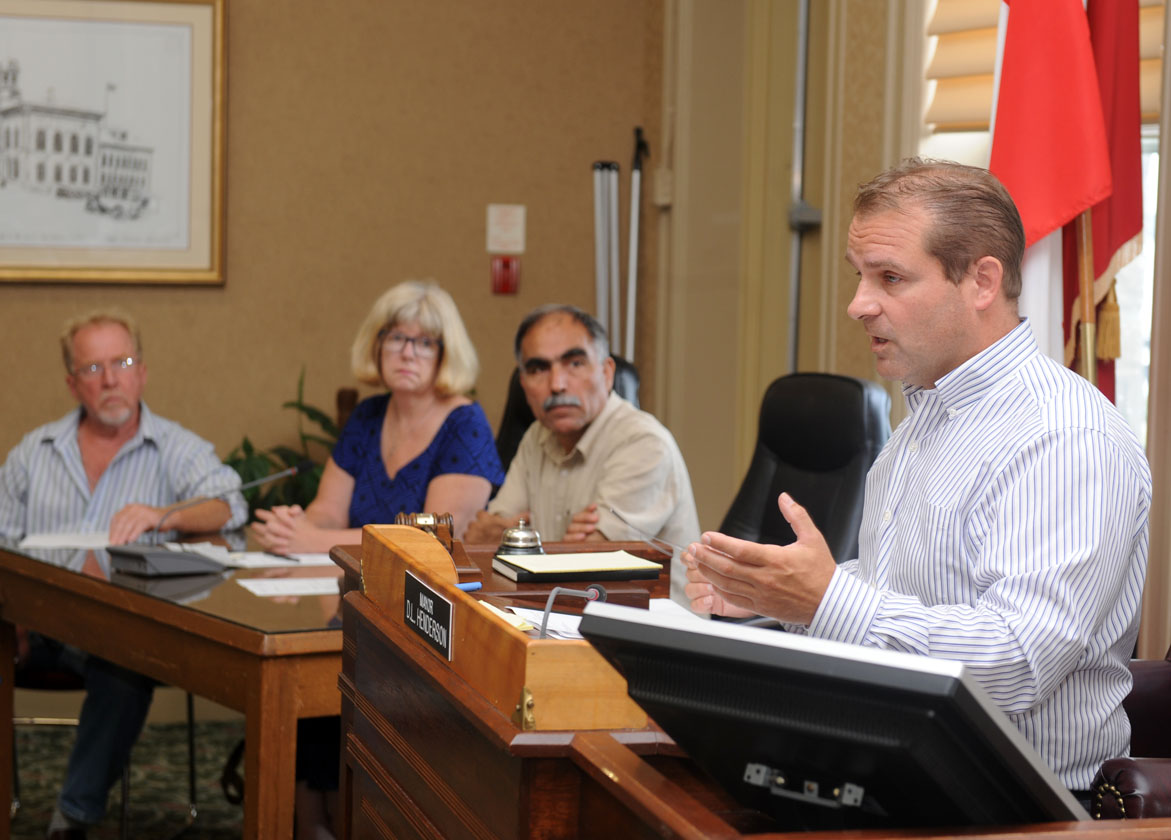
(Mayor David Henderson, right, speaks at a 2015 refugee assistance meeting. To his left is Ahmad Khadra.)
We Canadians have always had a guilty tendency to rejoice when noticed, favourably, by our country’s bigger partners.
It’s a tendency we don’t like to acknowledge, since it exposes a lingering inferiority complex, and that might explain why reaction in Brockville to a very favourable piece on the area’s refugee policy, in the British magazine The Economist, has met with a relatively muted reaction here.
Beyond that, there also lies a much bigger sense of neighbourly discretion.
The column by The Economist’s David Rennie is the kind of thing Dave Paul would be cheering about to the high heavens had he not recently retired as Brockville’s economic development director.
It is a validation, of sorts, of the work Refugees for Brockville has been doing since the shocking images of Alan Kurdi’s death in September 2015 galvanized world opinion on the Syrian refugee crisis and, quite possibly, changed the course of our own federal election.
The grassroots refugee relief effort that emerged locally from that global tragedy should indeed make us proud, as should some recognition from one of Canada’s older blood relatives.
(Some British habits die hard, however. Early in the column, Rennie refers to Brockville and Morristown as “the two settlements.”)
But local reaction, as I said, has been muted. Mayor David Henderson proudly referred to the coming Economist piece in his recent state-of-the-city address to the Brockville and District Chamber of Commerce, and on the weekend opined that it can only help in the city’s ongoing effort to attract investment and new residents.
“Brockville as an international example of welcome,” Jacqueline Schoemaker Holmes, head of Refugees for Brockville, posted on Facebook with the Economist link. She calls it "a proud day for Brockville" and touches on the efforts of local volunteers.
And Rev. Marianne Emig Carr, who has been active with Refugees for Brockville since the start, said Rennie’s column “certainly is positive of what we’ve been doing here in Brockville.”
However, she did acknowledge that “it’s a little heavy on the American side.”
Ay, and there’s the rub, and the reason local reaction won't go beyond these polite and muted responses.
Upstate New York is Trump country now, and Rennie’s travels through the area across the river from us exposed Trumpian attitudes that, on this side of the river, continue to cause revulsion.
“An hour down the road from Morristown, in Watertown, reverberations continue from a council meeting last October at which speakers outlined an economic and moral case for welcoming refugees,” Rennie writes.
“The council member behind that discussion, Teresa Macaluso, has been accused in local blogs of wanting to import terrorists. Constituents telephoned to thunder: ‘We look after our own.’ At the next meeting, a local shouted about Muslims raping women and beheading people.”
Later on, he quotes Father Steven Murray, pastor of Watertown’s Holy Family Church, as saying that, as far back as the 19th and early 20th centuries: “We didn’t want the Irish here, then they didn’t want the Italians here.”
I can’t honestly profess to know enough about Upstate New York or its people to dispute Rennie’s account of the region or the “visceral” distrust of refugees he found there.
Nor do I doubt that councillor Macaluso, Father Murray and the good people of Utica are not alone in pushing back against such attitudes.
What I do know about is the prevailing attitude on this side of the border toward our American neighbours.
Speaking of blood relatives, there is plenty of that going on around here. Family trees have branches on both sides of the St. Lawrence and for many of us along the Seaway, the Americans are literally our siblings or cousins.
Then there’s the local cross-border culture. We are a region of weekend shoppers in, well, Watertown; of trips to Alex Bay and Boldt Castle. Here in the newsroom, I have a Jets fan on one side of my workspace and a Giants fan on the other.
It was precisely a sense of affront to this cross-border culture that spurred Sentator Bob Runciman to action after an American fisherman was harshly treated by Canadian border officers.
So, when a major British publication has someone straddle the border and contrast our generosity with our cousins’ apparent xenophobia, our first instinct is not to beat our chests or gloat.
(It will give us a chance to go on bashing Trump, but that’s a different matter.)
Rather, we will hold our tongues, remember generations of cross-border history and hope things turn out for the better across the river.
At most, our reaction might be closer to the one with which Rennie ends his piece, where he quotes Brockville’s Ahmad Khadra:
“His adopted country is ‘more civilised, I’m sorry,’ he apologises. Spoken like a Canadian.”